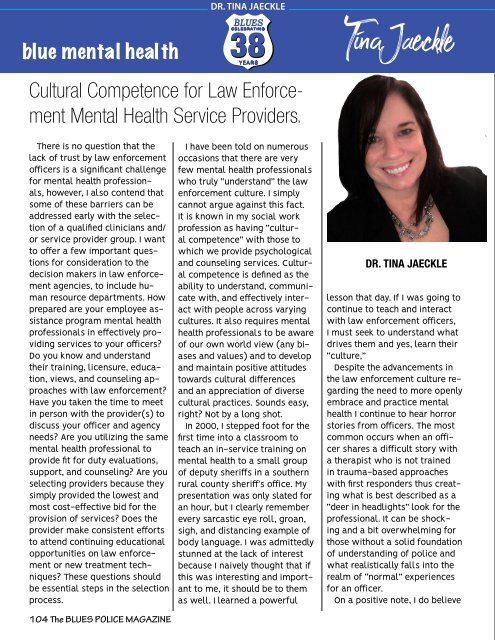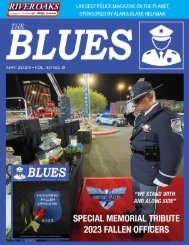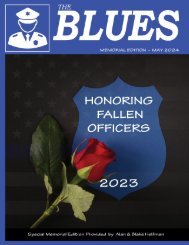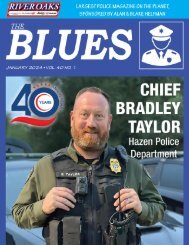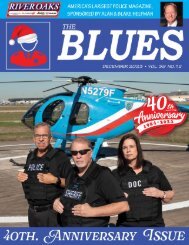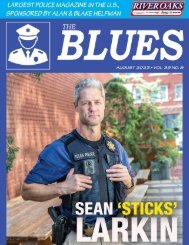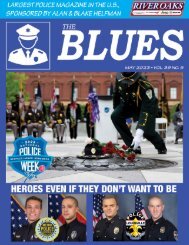MARCH 2022. Blues Vol 38 No. 3
FEATURES 42 Vote Their Ass Out 46 Remembering Those We’ve Lost to COVID 50 Remembering Those We’ve Lost to LOD Deaths 56 10-Year Olds Dream Becomes a Reality DEPARTMENTS 8 Publisher’s Thoughts 12 Editor’s Thoughts 14 Your Thoughts 16 News Around the US 32 Where to Eat - El Mercadito 34 Where to Shop - Central Police Supply 38 Defending Your Rights - James Wood 75 War Stories 84 Aftermath 88 Open Road 92 Healing Our Heroes 94 Daryl’s Deliberations 98 HPOU - From the President, Douglas Griffith 100 Light Bulb Award - Judge Dora & Her Posse 102 Running 4 Heroes 104 Blue Mental Health with Tina Jaeckle 106 Off Duty with Rusty Barron 108 Ads Back in the Day 112 Parting Shots 114 Now Hiring - L.E.O. Positions Open in Texas 138 Back Page
FEATURES
42 Vote Their Ass Out
46 Remembering Those We’ve Lost to COVID
50 Remembering Those We’ve Lost to LOD Deaths
56 10-Year Olds Dream Becomes a Reality
DEPARTMENTS
8 Publisher’s Thoughts
12 Editor’s Thoughts
14 Your Thoughts
16 News Around the US
32 Where to Eat - El Mercadito
34 Where to Shop - Central Police Supply
38 Defending Your Rights - James Wood
75 War Stories
84 Aftermath
88 Open Road
92 Healing Our Heroes
94 Daryl’s Deliberations
98 HPOU - From the President, Douglas Griffith
100 Light Bulb Award - Judge Dora & Her Posse
102 Running 4 Heroes
104 Blue Mental Health with Tina Jaeckle
106 Off Duty with Rusty Barron
108 Ads Back in the Day
112 Parting Shots
114 Now Hiring - L.E.O. Positions Open in Texas
138 Back Page
Create successful ePaper yourself
Turn your PDF publications into a flip-book with our unique Google optimized e-Paper software.
DR. TINA JAECKLE<br />
blue mental health<br />
Cultural Competence for Law Enforcement<br />
Mental Health Service Providers.<br />
There is no question that the<br />
lack of trust by law enforcement<br />
officers is a significant challenge<br />
for mental health professionals,<br />
however, I also contend that<br />
some of these barriers can be<br />
addressed early with the selection<br />
of a qualified clinicians and/<br />
or service provider group. I want<br />
to offer a few important questions<br />
for consideration to the<br />
decision makers in law enforcement<br />
agencies, to include human<br />
resource departments. How<br />
prepared are your employee assistance<br />
program mental health<br />
professionals in effectively providing<br />
services to your officers?<br />
Do you know and understand<br />
their training, licensure, education,<br />
views, and counseling approaches<br />
with law enforcement?<br />
Have you taken the time to meet<br />
in person with the provider(s) to<br />
discuss your officer and agency<br />
needs? Are you utilizing the same<br />
mental health professional to<br />
provide fit for duty evaluations,<br />
support, and counseling? Are you<br />
selecting providers because they<br />
simply provided the lowest and<br />
most cost-effective bid for the<br />
provision of services? Does the<br />
provider make consistent efforts<br />
to attend continuing educational<br />
opportunities on law enforcement<br />
or new treatment techniques?<br />
These questions should<br />
be essential steps in the selection<br />
process.<br />
I have been told on numerous<br />
occasions that there are very<br />
few mental health professionals<br />
who truly “understand” the law<br />
enforcement culture. I simply<br />
cannot argue against this fact.<br />
It is known in my social work<br />
profession as having “cultural<br />
competence” with those to<br />
which we provide psychological<br />
and counseling services. Cultural<br />
competence is defined as the<br />
ability to understand, communicate<br />
with, and effectively interact<br />
with people across varying<br />
cultures. It also requires mental<br />
health professionals to be aware<br />
of our own world view (any biases<br />
and values) and to develop<br />
and maintain positive attitudes<br />
towards cultural differences<br />
and an appreciation of diverse<br />
cultural practices. Sounds easy,<br />
right? <strong>No</strong>t by a long shot.<br />
In 2000, I stepped foot for the<br />
first time into a classroom to<br />
teach an in-service training on<br />
mental health to a small group<br />
of deputy sheriffs in a southern<br />
rural county sheriff’s office. My<br />
presentation was only slated for<br />
an hour, but I clearly remember<br />
every sarcastic eye roll, groan,<br />
sigh, and distancing example of<br />
body language. I was admittedly<br />
stunned at the lack of interest<br />
because I naively thought that if<br />
this was interesting and important<br />
to me, it should be to them<br />
as well. I learned a powerful<br />
DR. TINA JAECKLE<br />
lesson that day. If I was going to<br />
continue to teach and interact<br />
with law enforcement officers,<br />
I must seek to understand what<br />
drives them and yes, learn their<br />
“culture,”<br />
Despite the advancements in<br />
the law enforcement culture regarding<br />
the need to more openly<br />
embrace and practice mental<br />
health I continue to hear horror<br />
stories from officers. The most<br />
common occurs when an officer<br />
shares a difficult story with<br />
a therapist who is not trained<br />
in trauma-based approaches<br />
with first responders thus creating<br />
what is best described as a<br />
“deer in headlights” look for the<br />
professional. It can be shocking<br />
and a bit overwhelming for<br />
those without a solid foundation<br />
of understanding of police and<br />
what realistically falls into the<br />
realm of “normal” experiences<br />
for an officer.<br />
On a positive note, I do believe<br />
there are many mental health<br />
professionals who are interested<br />
in becoming more culturally<br />
competent in law enforcement<br />
norms, values, policies, and the<br />
challenges of the field. But it<br />
does take time and training and<br />
lots of patience. Both the agency<br />
and the professional must work<br />
collaboratively to build this beneficial<br />
relationship. I encourage<br />
thinking outside of the box ideas<br />
including regularly riding with an<br />
officer to observe the conditions<br />
of the job, eating a meal with a<br />
group of LEOs, volunteering to<br />
teach mental health topics in the<br />
academy, and simply taking the<br />
time to get to know our wonderful<br />
men and women in uniform.<br />
With the assistance of Dr. Nancy<br />
Wesselink in Georgia, we are<br />
currently developing a curriculum<br />
to offer to trauma trained<br />
mental health professionals who<br />
seek to become culturally competent<br />
with officers. I recognize<br />
it is a small step but an important<br />
one no less. For those interested<br />
in attending this crucial<br />
training, either virtually or in<br />
person, please contact me directly<br />
at tjaeckle@bellsouth.net.<br />
104 The BLUES POLICE MAGAZINE The BLUES POLICE MAGAZINE 105


